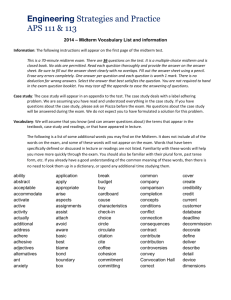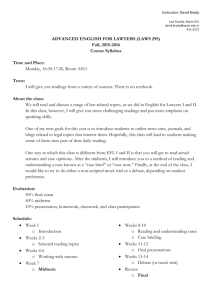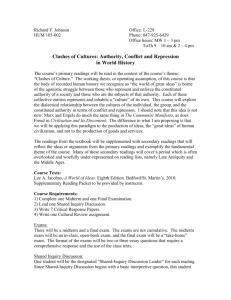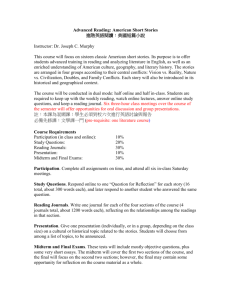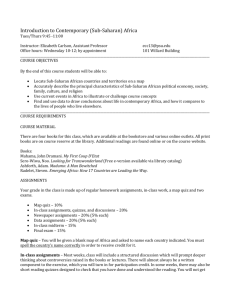LECTURE TOPICS AND READING ASSIGNMENTS
advertisement
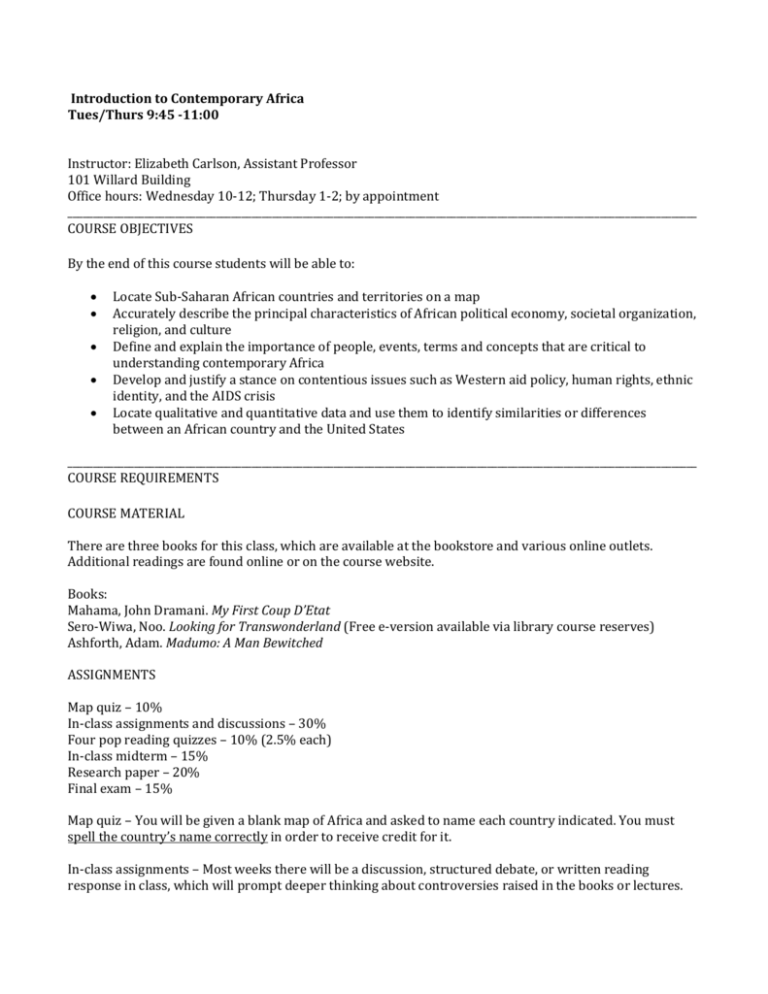
Introduction to Contemporary Africa Tues/Thurs 9:45 -11:00 Instructor: Elizabeth Carlson, Assistant Professor 101 Willard Building Office hours: Wednesday 10-12; Thursday 1-2; by appointment ___________________________________________________________________________________________________________________________ COURSE OBJECTIVES By the end of this course students will be able to: Locate Sub-Saharan African countries and territories on a map Accurately describe the principal characteristics of African political economy, societal organization, religion, and culture Define and explain the importance of people, events, terms and concepts that are critical to understanding contemporary Africa Develop and justify a stance on contentious issues such as Western aid policy, human rights, ethnic identity, and the AIDS crisis Locate qualitative and quantitative data and use them to identify similarities or differences between an African country and the United States ___________________________________________________________________________________________________________________________ COURSE REQUIREMENTS COURSE MATERIAL There are three books for this class, which are available at the bookstore and various online outlets. Additional readings are found online or on the course website. Books: Mahama, John Dramani. My First Coup D’Etat Sero-Wiwa, Noo. Looking for Transwonderland (Free e-version available via library course reserves) Ashforth, Adam. Madumo: A Man Bewitched ASSIGNMENTS Map quiz – 10% In-class assignments and discussions – 30% Four pop reading quizzes – 10% (2.5% each) In-class midterm – 15% Research paper – 20% Final exam – 15% Map quiz – You will be given a blank map of Africa and asked to name each country indicated. You must spell the country’s name correctly in order to receive credit for it. In-class assignments – Most weeks there will be a discussion, structured debate, or written reading response in class, which will prompt deeper thinking about controversies raised in the books or lectures. Since you will need to back up your arguments with class material, it is strongly recommended that you bring your readings to class so that you can refer to them. Obviously, it will be hard for you to participate, and therefore to get participation credit, if you are not in class. Reading Quizzes – You will have to take four short quizzes about material in the readings. Any week with reading is a week in which there may be a reading quiz. Each one is worth 2.5% of your final grade. Because readings are assigned for a week at a time, quizzes will only be on Thursdays. Midterm and Final – The exams will each contain a mix of multiple-choice and short answer questions. You may be asked to do any of the following: recall basic facts about African countries; define terms; indentify people or key events and describe their importance. Final paper – In a six-page paper, you will compare and contrast one African country to the US. You must use both qualitative and quantitative evidence to make the case that the two countries are fundamentally similar or fundamentally different. You may use class material in your analysis, but are also expected to locate and use outside material. Compare and contrast the two countries along one of the following dimensions: Women’s role in society Religion and faith The importance of race/ethnic identity Inequality and poverty ABSENCE I do not take attendance, but you will miss points if you are absent on a day with a quiz or other in-class assignment. If you are absent for a legitimate reason such as illness, you make make up the assignment, but only if you let me know before class starts that you will be absent. ACADEMIC HONESTY By enrolling in this class, you are indicating that you understand and agree to abide by all university regulations on cheating and plagiarism. In the event that you turn in something that violates these academic norms, ignorance will not be accepted as an excuse. I will turn all suspicious work over to the administration. Please note that I do not allow audio (or video) recording of class without prior permission and consider the sharing of any such recordings to be cheating. ___________________________________________________________________________________________________________________________ CLASS TOPICS AND READINGS UNIT ONE: Political History Week One: Introduction and Pre-Colonial Africa Mahama, John Dramani. My First Coup D’Etat. Pages 1-160. Week Two: Colonialism and Independence Mahama, John Dramani. My First Coup D’Etat. Pages 160-318. ****MAP QUIZ IN CLASS**** 2 Week Three: Current African Political Setting **Joel Barkan. 2002. The Many Faces of Africa. Harvard International Review 24(2). (Via ProQuest on library website.) Gettleman, Jeffrey. 2013. The Global Elite’s Favorite Strongman. New York Times. Flood, Zoe. 2013. Kenyan Supreme Court Upholds Kenyatta Election Win. The Telegraph. Election Observation Group. 2013. The Results are Consistent with Election Observation Group’s Parallel Vote Tabulation. UNIT TWO: Structure of Society Week Four: Ethnicity Sero-Wiwa, Noo. Looking for Transwonderland. Prologue – Chapter 5. Week Five: Celebrations Sero-Wiwa, Noo. Looking for Transwonderland. Chapters 6-12. Hirsch, Agua. 2013. Ghanaians call for Fridays off as Funerals Take Over Weekends. The Guardian. Mgamba, Richard. 2008. How to say “I do” to the Wedding Committee. The Mail and Guardian. Week Six: Family Structures Sero-Wiwa, Noo. Looking for Transwonderland. Chapters 13-16 Meintjes, Helen et al. 2012. Child-Headed Households in South Africa: A Statistical Brief. Associated Press. Uganda to Pass Anti-Gay Law as “Christmas Gift”. 2012. USA Today. Africa’s First Traditional Gay Wedding? 2013. The Huffington Post. Week Seven: Women in Family and Society Abby Morrow Richardson. Women’s Inheritance Rights in Africa: The Need to Integrate Cultural Understanding and Legal Reform. Human Rights Brief. Matthews, Shazaan et al. 2004. Every Six Hours a Woman is Killed by her Intimate Partner. MRC Policy Brief. Powley, Elizabeth. 2005. Rwanda: Women Hold Up Half of Parliament. In Women in Parliament: Behind the Numbers. Devlin, Claire and Robert Elgie. 2008. The Effect of Increasing Women’s Representation in Parliament. Parliamentary Affairs 61(2). Week Eight: Midterm Review and Midterm ***MIDTERM IN CLASS OCTOBER 17th*** UNIT THREE: Religion and the Supernatural Week Nine: African Traditional Religion Ashforth, Adam. Madumo: A Man Bewitched. Chapters 1-10 Week Ten: Christianity and Islam Ashforth, Adam. Madumo: A Man Bewitched. Chapters 10-20 Mwangi, Isaac. As Religion Grows, So Does Inter-Faith Conflict in Africa. 2012. The East African. 3 UNIT FOUR: Economic Development Week Eleven: Poverty Banerjee, Abhijit and Esther Duflo. 2007. The Economic Lives of the Poor. Journal of Economic Perspectives 21(1). UNICEF. 2008. A Snapshot of Drinking Water and Sanitation in Africa. Porter, Gina et al. 2012. Child Porterage and Africa’s Transportation Gap. World Development. Simwanza, Obert. 2013. Populist No More: Sata Scraps Food Subsidy. Africa Review. Week Twelve: Economic Resources Copson, Raymond. 2004. Africa: Development Issues and Policy Options. Pages 1-24. Congressional Research Service Brief. Taylor, Scott. 2009. Labor Markets in Africa: Multiple Challenges, Limited Opportunities. Current History. **Radelet, Steven. 2010. The Coming of the Cheetahs. Chapter 7 In Emerging Africa. (On course website) Innovation in Africa: Upwardly Mobile. 2012. The Economist. Week Thirteen: Health Crisis Gallup, John Luke and Jeffrey Sachs. The Economic Burden of Malaria. American Journal of Tropical Medicine and Hygiene. **Philip J Hilts. Changing Minds: Botswana Beats Back AIDS. Chapter Four in Rx for Survival: Why We Must Rise to the Global Challenge (On course website) Boseley, Sarah. 2008. Mbeki AIDS Policy Led to 330,000 Deaths. The Guardian. Kielty, Matthew. 2013. Nodding Syndrome: A Devastating Medical Mystery in Uganda. NPR. Week Fourteen: International Response Dambisa Moyo. Why Foreign Aid is Hurting Africa. Wall Street Journal. Nicolas Kristof. Aid: Can it Work. New York Review of Books. Wachman, Richard. 2011. South Africa Resists March of Walmart. The Guardian. Vines, Alex. China in Africa: A Mixed Blessing? Current History *** PAPER DUE IN CLASS*** Week Fifteen: Catch-up and Final review ***FINAL EXAM DURING FINALS WEEK*** 4
